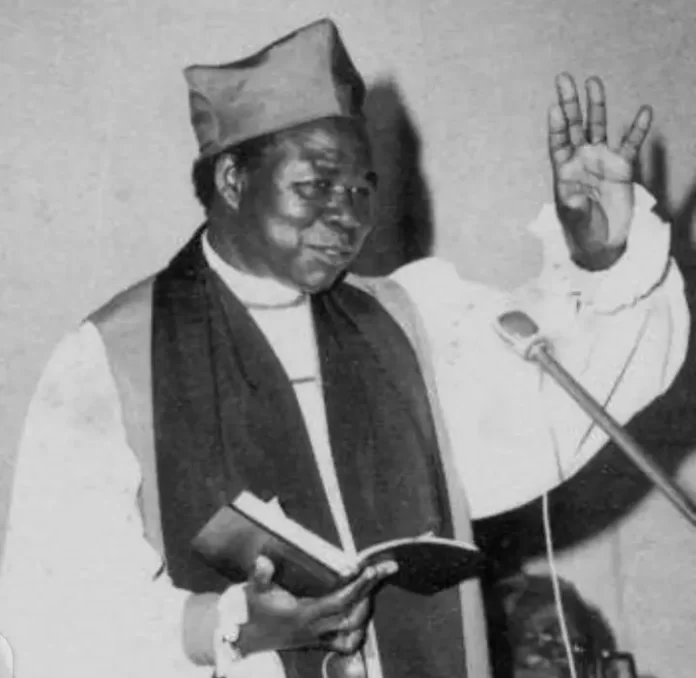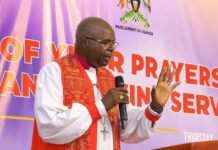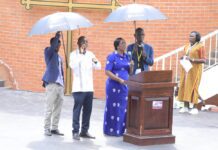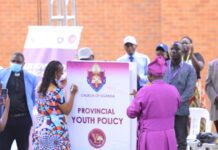
Several Ugandans have convened in Northern Uganda to commemorate Janani Luwum Day after Archbishop St. Janani Jakaliya Luwum, the archbishop of the Church of Uganda, was murdered in 1977 on the orders of President Idi Amin. Madi and West Nile dioceses led prayers during the national celebrations at Wii-Gweng in Mucwini sub-county, Kitgum district, on Friday, February 16, 2024.
St. Luwum, who was the Archbishop of the Church of Uganda from 1974 to 1977, was one of the most influential leaders of the modern church in Africa.
The Life of Archbishop Luwum
Archbishop Luwum was born in the village of Mucwini in Kitgum district to Acholi parents. He attended Gulu High School and Boroboro Teacher Training College, after which he taught at a primary school. Luwum converted to Christianity in 1948, and in 1949 he went to Buwalasi Theological College.
In 1950, he was attached to St. Philip’s Church in Gulu and was ordained a deacon in 1953; the following year, he was ordained a priest. He served in the Upper Nile Diocese of Uganda and later in the Diocese of Mbale. In 1969, he was consecrated Bishop of the Diocese of Northern Uganda at Gulu. After five years, he was appointed Archbishop of the Metropolitan Province of Uganda, Rwanda, Burundi, and Boga in Zaire, becoming the second African to hold this position.
Archbishop Luwum was a leading voice in criticising the excesses of the Idi Amin regime that assumed power in 1971. In the same year, Archbishop Luwum delivered a note of protest to dictator Idi Amin against the policies of arbitrary killings and unexplained disappearances. Shortly afterwards, the archbishop and other leading churchmen were accused of treason.
On February 16, 1977, Luwum was arrested together with two cabinet ministers identified as Erinayo Wilson Oryema and Charles Oboth Ofumbi. The same day, Idi Amin convened a rally in Kampala with the three accused present. It is said that a few other suspects were paraded forth to read out confessions implicating the three men.
The Archbishop was accused of being an agent of the exiled former President Milton Obote and of planning to stage a coup. The next day, Radio Uganda announced that the three had been killed when the car transporting them to an interrogation centre collided with another vehicle. Although it was described as a car crash, it is generally known that he was murdered on the orders of then-President Idi Amin.
The accident, which Radio Uganda reported, occurred when the victims tried to overpower the driver in an attempt to escape. When Luwum’s body was released to his relatives, it was riddled with bullets. Henry Kyemba, the Minister of Health in Amin’s government, later wrote in his book A State of Blood that “the bodies were bullet-riddled. The Archbishop had been shot through the mouth and had at least three bullets in the chest. The ministers had been shot in a similar way, but only in the chest and not through the mouth. Oryema had a bullet wound through the leg.”
According to the later testimony of witnesses, the victims had been taken to an army barracks, where they were bullied, beaten, and finally shot. Some reports even had it that Amin himself had pulled the trigger, but he angrily denied the charge, and there were no first-hand witnesses.
According to the Vice President of Uganda, Mustafa Adrisi, and the Human Rights Commission, Amin’s right-hand man, Isaac Maliyamungu, carried out the murder of Luwum and his colleagues.
The significance of Archbishop Janani Luwum’s death to current religious leaders lies in the enduring legacy of his courage, faith, and commitment to justice. His martyrdom continues to inspire religious leaders to take a stand against oppression, advocate for human rights, and work towards social justice. Here are some key points regarding the significance of his death to current religious leaders.
According to Kenneth Anderson Lukwago, a producer at Radio One in Kampala, Archbishop Luwum courageously spoke out against human rights violations and political repression under the rule of President Idi Amin Dada. His outspoken criticism of the government’s actions made him a symbol of resistance and an advocate for those suffering from the Amin regime’s atrocities.
“He went directly to tell those in power about the wrongs they were committing. At the moment, we have religious leaders who have even become political. They are not even ashamed. They have even gone to the extent of showing their political affiliation,” Lukwago said.
Archbishop Luwum’s unwavering commitment to speaking truth to power and his refusal to compromise his moral principles in the face of political oppression serve as an example for contemporary religious leaders. His legacy encourages today’s religious figures to be moral leaders who prioritise justice, compassion, and integrity.
His death and the subsequent global attention he received underscore the influential role that religious leaders play in shaping public discourse and advocating for human rights and social change. Current religious leaders should draw from Archbishop Luwum’s example to use their positions to address social injustices and promote peace and reconciliation within their communities and beyond.
Archbishop Luwum’s martyrdom remains a symbol of the ongoing struggle for human rights and religious freedom. His legacy inspires contemporary religious leaders to be proactive advocates for the rights of marginalised communities, denounce violence and oppression, and promote reconciliation in conflict-affected areas.
His death also highlights the importance of interfaith dialogue and collaboration. The Archbishop’s courageous stance against injustice transcended religious boundaries and inspired unity across diverse faith communities. Modern religious leaders can draw inspiration from this example to foster understanding, respect, and cooperation among people of different religious traditions.
The global reaction to Archbishop Luwum’s death serves as a reminder of the interconnectedness of human rights struggles. His legacy encourages religious leaders to work in solidarity with human rights organisations and other advocacy groups to address pressing social, political, and economic issues affecting their communities. He is compared to people like South Africa’s Anglican bishop and theologian, Desmond Tutu, known for his work as an anti-apartheid and human rights activist.
The annual commemoration of Archbishop Janani Luwum on February 16th serves as a reminder of his impact and the ongoing relevance of his message of courage, compassion, and unwavering faith. It is an opportunity to honour his memory and the principles for which he stood, as well as to reflect on the continuing struggle for human rights and justice in Uganda and globally.














